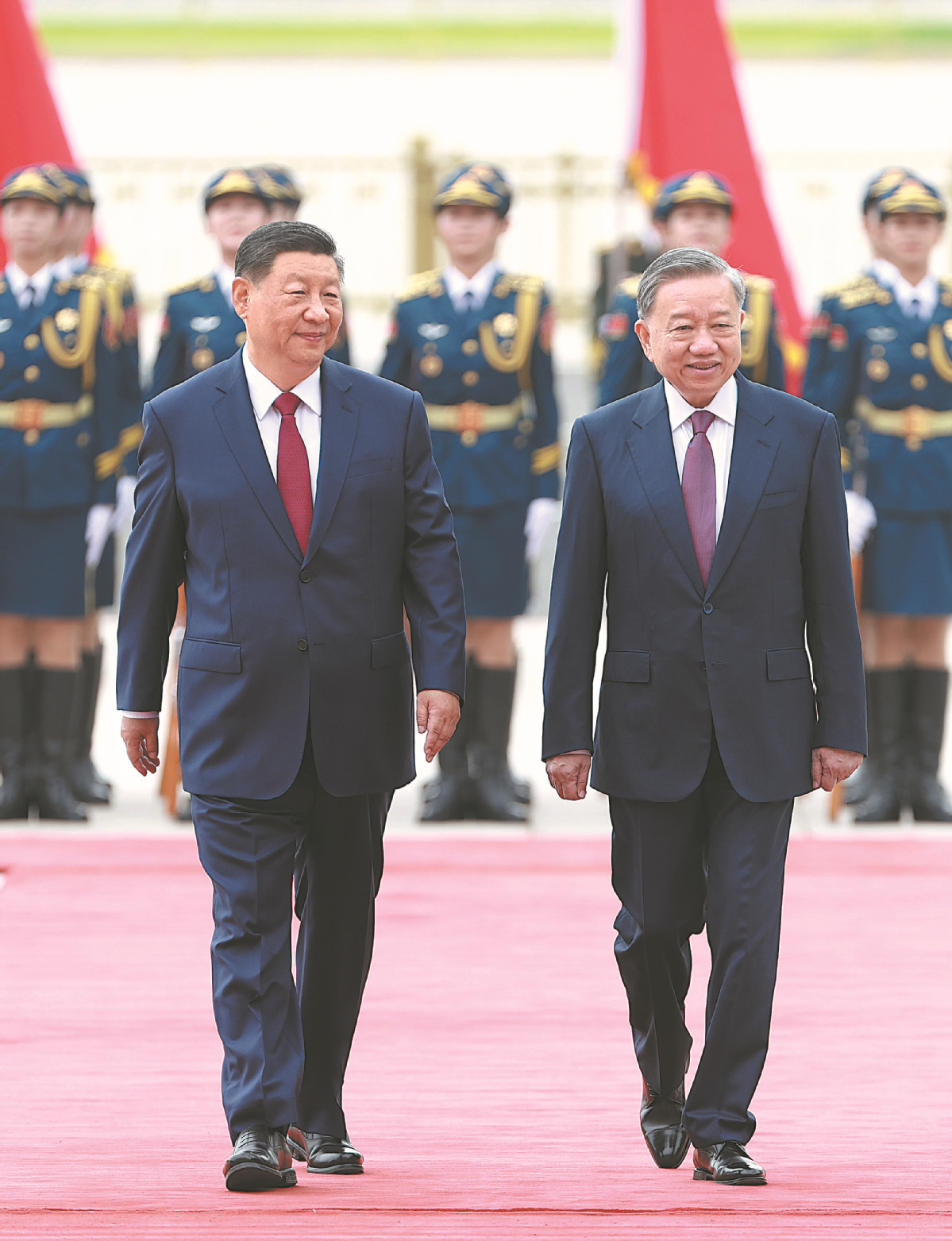
Xi Jinping, general secretary of the Communist Party of China Central Committee and Chinese president, and To Lam, general secretary of the Communist Party of Vietnam Central Committee and Vietnamese president, attend a welcoming ceremony in Beijing on Monday for the Vietnamese leader before their talks at the Great Hall of the People. FENG YONGBIN/CHINA DAILY
China rolled out the red carpet on Monday for Vietnam's top leader To Lam, and the two socialist countries vowed to further enhance their comprehensive strategic cooperative partnership and advance the building of a community with a shared future that carries strategic significance.
During their talks at the Great Hall of the People in Beijing, Xi Jinping, general secretary of the Communist Party of China Central Committee and Chinese president, welcomed Lam's state visit to China, which is the Vietnamese leader's first overseas trip since he became general secretary of the Communist Party of Vietnam Central Committee on Aug 3.
Xi said the visit reflects the great importance Lam attaches to the relations between the two parties and the two countries, and also embodies the high level and strategic importance of China-Vietnam ties.
Lam succeeded Nguyen Phu Trong, who passed away last month, and has been serving as the Vietnamese president since May.
The first stop of Lam's three-day state visit to China, which started on Sunday, took him to Guangzhou, Guangdong province, where former leader of Vietnam Ho Chi Minh spent time promoting revolutionary activities around a century ago.
Saying that the traditional friendship between the two parties and the two countries is as good as "comrades and brothers", Xi called for consistent efforts to build the China-Vietnam community with a shared future, a consensus reached between the two sides during his visit to Vietnam in December.
China regards Vietnam as a priority in its neighborhood diplomacy, Xi said.
Noting that both countries are at a critical stage of national development and revitalization, he underlined the need for them to solidify a pattern for the development of bilateral relations featuring higher political mutual trust, more substantial security cooperation, deeper pragmatic collaboration, stronger public support, closer multilateral coordination and better management of differences.
China is willing to maintain close strategic communication and high-level exchanges with Vietnam, and actively explore ways to expand the synergy between the Belt and Road Initiative and Vietnam's Two Corridors and One Economic Circle strategy, he said.
Xi also emphasized the need for both sides to step up the connectivity of railway, highway and port infrastructure, enhance connectivity of smart customs, and work together to build secure and stable industrial and supply chains.
Lam highlighted the importance of the comprehensive strategic cooperative partnership between the two countries, emphasizing that China is a strategic choice and top priority in Vietnam's foreign policy.
The CPV and the Vietnamese government will inherit Trong's legacy, uphold the leadership of the Communist Party and the socialist path, and steadfastly advance on the path jointly set by the older generations of leaders of both countries, especially Trong and Xi, he said.
Lam told Xi that Vietnam adheres to independence and autonomy, firmly upholds the one-China policy and considers Taiwan an inseparable part of Chinese territory. He added that his country resolutely opposes any form of "Taiwan independence" separatist activities and firmly supports China in achieving reunification.
Lam also expressed Vietnam's willingness to work with China to properly manage maritime disputes, in order to jointly maintain regional peace and stability.
Vietnam is ready to have closer coordination with China on international affairs, and uphold multilateralism as well as international fairness and justice to contribute to world peace and development, he said.
After their talks, both leaders witnessed the signing of multiple bilateral cooperation agreements in various fields such as Party schools, mutual connectivity, industry, finance, customs inspection and health.
Observers said that Lam's visit marks a milestone in China-Vietnam relations, which will be an example of a new pattern of cooperation between two socialist countries facing challenges and tasks of modernization based on a similar historical trajectory and common international environment.
Hannan Hussain, co-founder and senior expert at Initiate Futures, a policy think tank based in Islamabad, Pakistan, said the visit is an occasion for both countries to take stock of their cooperation achievements, promote a common vision for aligning markets, and increase favorable exposure for their industries and manufacturers.
China has been Vietnam's top trading partner for many years. Vietnam is China's top trading partner in the Association of Southeast Asian Nations and China's fourth-largest trading partner globally. Trade between China and Vietnam reached $229.8 billion in 2023, according to the Foreign Ministry.
Hussain said Lam's visit is expected to play a crucial role in expanding future investments, fast-tracking development projects and promoting new directions for trade and industrial cooperation.





